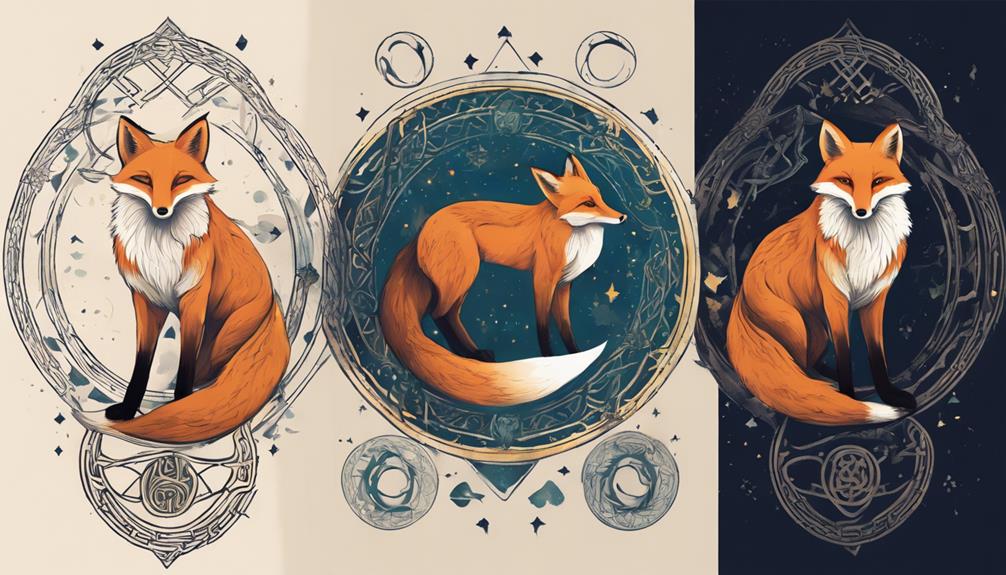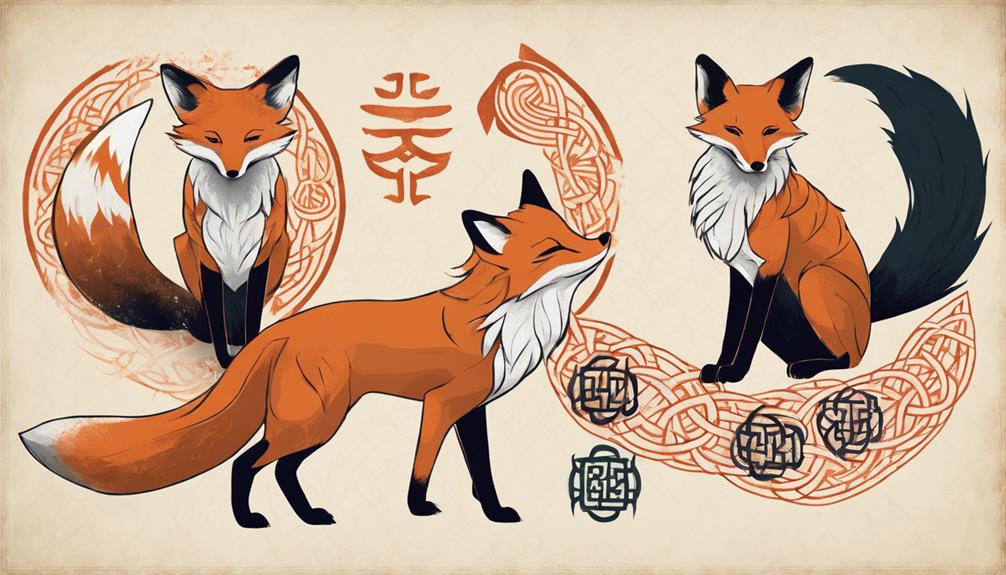Summary
- 1 Symbolism of the Fox in Mythology
- 2 The Fox as a Trickster
- 3 Foxes in folklore and legends
- 4 Foxes as spirit animals
- 5 Meaning of the Fox in Different Cultures
- 6 The role of the fox in symbolism
- 7 Foxes: Adaptability and Resilience
- 8 Frequently asked questions
- 8.1 Are there specific breeds of foxes with different symbolic meanings?
- 8.2 What is the significance of the number of tails a fox has?
- 8.3 Do foxes have any connection with astrology or zodiac signs?
- 8.4 Can the symbolism of the fox be found in modern literature or pop culture?
- 8.5 Are there taboos or superstitions related to foxes in certain cultures?
The fox has profound symbolisms in various cultures, embodying traits such as intelligence, cunning e adaptability. In Japanese mythology, it symbolizes luck and wisdom. Native American traditions regard it as a guide with cunning instincts. In European folklore, the fox is often depicted as a cunning trickster. Explore the world of fox symbology to discover the wealth of meanings in different cultures.
Symbolism of the Fox in Mythology

Examines how the fox has been represented in various mythologies around the world, revealing the significant meaning attached to this creature cunning. In different cultures, the fox embodies different meanings. In Japanese mythology, the kitsune represents intelligence, shape-shifting abilities, and good luck. These mythical foxes are often depicted as messengers of the Shinto deity Inari. In Native American traditions, the fox is a symbol of leadership, cunning, and adaptability. The Navajo see the fox as a teacher who imparts wisdom and quick thinking. In European mythology, the fox is often associated with cunning and deception, appearing in tales such as Aesop's fables as a cunning character who deceives others. The depiction of the fox as a trickster in many myths reflects its dual nature of being both a wise guide and a mischievous deceiver. Understanding the different roles of the fox in mythology adds depth to its symbolism and meaning across different cultures.
The Fox as a Trickster
The fox, known for its cunning and clever nature, plays the role of a trickster in various mythologies and folklore around the world. This cunning creature often embodies characteristics such as intelligence, quick thinking and a mischievous attitude. In many cultures, the fox is depicted as a trickster figure who uses his cunning and skill to deceive others and achieve his own goals.
In Japanese folklore, the kitsune is a mythical fox known for its shape-shifting abilities and magical powers. These fox spirits are often depicted as tricksters who like to play tricks on humans or test their virtues. Similarly, in Native American legends, the fox is seen as a cunning trickster who uses his cunning to deceive his opponents and navigate through difficult situations.
Foxes in folklore and legends

Foxes have always occupied a prominent place in the legends and in folk myths of different cultures, enchanting the audience with their cunning and mystical charm. In various traditions, foxes are often depicted as clever and cunning creatures, deceiving larger and stronger opponents through their intelligence and agility. In Japanese folklore, the Kitsune is a fox spirit known for its transformation skills and wisdom. In European folklore, tales about Reynard the Fox portray the fox as a cunning trickster Who uses his cunning to deceive opponents.
In Native American legends, foxes are seen as. adaptability symbols And quick thinking. The Navajo people believe that foxes possess healing powers and are associated with protection and guidance. In Chinese mythology, the spirit of the nine-tailed fox, known as Huli Jing, is a to be powerful and mystical Capable of great feats.
All over the world, foxes have captured the imagination of storytellers and listeners, embodying qualities of cunning, wisdom and mystery in the rich web of legends and myths.
Foxes as spirit animals
Let's talk about how foxes are perceived as spirit animals. We discover the symbolism of these intelligent creatures, the distinguishing features that distinguish them and the spiritual guidance they provide. Get ready to immerse yourself in the mystical world of foxes and their importance as spirit animals!
Symbolism of Foxes
Often associated with cunning and adaptability, foxes occupy a significant place in various cultures as spirit animals. In many traditions, the fox is revered for its intelligence, quick wit and ability to find a way through complicated situations. As a spirit animal, the fox is often seen as a guide or messenger, offering wisdom and guidance to those who need to find solutions to complex problems.
—
| Symbolism of Foxes | ||
|---|---|---|
| Feature | Symbolism | Meaning |
| Cunning | Cunning | Strategic thinking |
| Adaptability | Flexibility | Embracing change |
| Silencing | Remark | Seeing through the lies |
—
The cunning nature of the fox represents the importance of thinking innovatively and adapting to different situations. Its adaptability means the ability to welcome change and thrive in new environments. Fox silencing encourages you to carefully observe your surroundings and see through any deception that may come your way. Embracing these characteristics can help you overcome life's challenges with grace and wisdom.
Characteristics of the Fox
With their mystical appeal and symbolic significance, foxes embody a deep connection with the spiritual domain as guide animals. Foxes are known for their cunning and intelligence, traits that are reflected in their role as spiritual guides. They symbolize adaptability, quick thinking and the ability to navigate difficult situations with grace and agility.
As guide animals, foxes encourage you to trust your instincts and rely on your intelligence to overcome challenges. They remind you to remain alert and adaptable, ready to modify your strategies if necessary. Foxes are also associated with the spiritual world, acting as messengers between worlds and guiding you to tap into your spiritual intuition and wisdom.
When a fox appears as a guiding animal, it may prompt you to embody your cunning and resolve. Allow the fox's energy to inspire you to face life's obstacles with creativity and cunning, trusting your inner guidance To lead you on your spiritual path.
Spiritual guidance of the Fox
When contemplating the spiritual guidance of the fox, one can explore the symbolism and significance of foxes as spirit animals. The fox is often seen as a messenger from the spiritual world, offering wisdom and guidance to those who encounter it. In many cultures, the fox represents intelligence, cunning and adaptability, qualities that are highly valued in dealing with life's challenges.
As a spirit animal, the fox encourages you to rely on your instincts and intuition to guide you through difficult situations. It reminds you to remain adaptable and think quickly on your feet, just as the cunning fox does in the wild. The fox also symbolizes the importance of being stealthy and remaining aware of your environment.
If you feel drawn to the fox as a spirit animal, it may be a sign that you need to approach a situation with cunning and strategy. Embrace the fox's energy and let it guide you in making wise decisions and seizing opportunities as they arise.
Meaning of the Fox in Different Cultures

Exploring the symbolism of foxes in various cultures reveals a rich web of meanings and beliefs associated with these cunning animals. In Japanese culture, the fox, or kitsune, is often seen as a messenger of the rice deity, Inari, symbolizing wealth and prosperity. In the celtic legends, the fox is associated with magic and the transformation of form, embodying both cunning and wisdom. Native American tribes such as the Hopi and Navajo regard the fox as a figure of the trickster, who imparts valuable lessons through his antics.
In the Chinese mythology, the fox spirit, known as huli jing, is a transformer capable of great mischief or benevolence. In Korean legends, the kumiho is a nine-tailed fox known for its beauty and malevolence. I Maori of New Zealand see the fox as a guide for the dead, leading spirits to the afterlife. Across cultures, the fox represents adaptability, intelligence and sometimes a touch of unpredictability. It is fascinating to see how these different perspectives intertwine to form a complex portrait of this enigmatic creature.
The role of the fox in symbolism
We examine how the fox embodies symbolic attributes in different cultures and its representations in different beliefs and traditions. Understand the symbolic attributes of the fox can provide a deeper insight into the meanings associated with this cunning creature. From trickster to the guardian, the fox plays a multifaceted role in symbolic contexts around the world.
Symbolic attributes of the Fox
Discover the symbolic attributes of the fox to reveal the intriguing role this cunning creature plays in various cultures and beliefs. The fox is often associated with intelligence, quick wit, adaptability and cunning. These attributes have made the fox a prominent figure in folklore and mythology around the world. In many cultures, the fox is seen as a trickster figure, using his wits and ingenuity to outwit others. In Japanese mythology, the kitsune is a fox spirit known for its transformative abilities and as a messenger of the deity Inari. In Native American traditions, the fox is revered for its wisdom and ability to deal with life's challenges.
The fox's keen senses and ability to thrive in various environments have also contributed to its symbolic importance. Its elegant and agile nature symbolizes grace and agility in overcoming obstacles. In addition, the fox's solitary behavior in nature has led to associations with independence and self-reliance. Overall, the symbolic attributes of the fox highlight the multifaceted role of the creature in representing characteristics such as cunning, adaptability, wisdom, and grace in different cultures and beliefs.
Cultural representations of the fox
Investigating the various cultural representations of the fox reveals its rich symbolic importance across different traditions and beliefs. In many cultures, the fox is seen as a cunning and intelligent creature. In Japanese folklore, the kitsune is a fox spirit known for its shape-shifting abilities and wisdom. The Native American Navajo tribe regards the fox as a trickster figure, often deceiving others with his cunning. In European folklore, the fox is often portrayed as cunning and crafty, like Reynard the Fox in medieval tales.
In addition, the fox symbolizes adaptability and quick thinking in Chinese mythology, where it is associated with the god of longevity. In Celtic beliefs, the fox is linked to the afterlife and is considered a guide for the souls of the departed. Across cultures, the fox represents a mixture of traits such as intelligence, wit and adaptability, making it a fascinating symbol with multifaceted meanings.
Foxes: Adaptability and Resilience

Foxes demonstrate remarkable adaptability and resilience in various environmental conditions, showing their ability to thrive in diverse habitats. These wily creatures have evolved to thrive in a wide range of landscapes, from forests and mountains to urban areas. A key factor contributing to their adaptability is their omnivorous diet, which allows them to consume a variety of foods depending on what is available.
In times of scarcity, foxes can adapt their feeding habits, seeking fruit, insects, small mammals or even litter for sustenance. Their ability to adapt quickly to changing circumstances has allowed them to survive and even thrive in environments where other species struggle. In addition, foxes are known for their ingenuity, often using their intelligence to outwit predators and secure food sources.
Their resilience is further evident in their reproductive strategies, with foxes able to adapt their breeding patterns based on factors such as food availability and environmental conditions. This adaptability and resilience make foxes fascinating creatures that continue to inspire wonder and awe.
Frequently asked questions
Are there specific breeds of foxes with different symbolic meanings?
There are no specific fox breeds linked to symbolic meanings, but foxes as a whole have different symbolic meanings in various cultures. In folklore, they often represent cunning or intelligence. They may symbolize adaptability and quick thinking skills. Some consider them to be tricksters or bringers of good luck. Foxes also embody a connection to the spirit world in some beliefs. Thus, although there are no distinct breeds with specific meanings, fox symbolism is rich and varied in different traditions.
What is the significance of the number of tails a fox has?
Have more queues has an important meaning in fox folklore. In some cultures, each additional tail represents wisdom, cunning or age. The more tails a fox has, the more it is believed to be mystical and powerful. This symbolism is deeply rooted in various myths and legends, where foxes with multiple tails are often represented as shape-shifters or magical beings. Thus, the number of tails a fox has can have different meanings depending on the cultural context.
Do foxes have any connection with astrology or zodiac signs?
Certainly, foxes have connections with astrology and zodiac signs. In some cultures, the fox is associated with cunning and intelligence, traits often linked to certain zodiac signs such as Gemini or Scorpio. Foxes can symbolize adaptability and cunning, qualities that align with the characteristics of individuals born under these signs. So if you are an astrology buff, you may find it fascinating to delve further into the world of the fox!
Can the symbolism of the fox be found in modern literature or pop culture?
In modern literature and pop culture, fox symbolism is abundant. From the cunning and crafty characters in novels and movies to the wise and mysterious foxes depicted in folktales, these creatures have left a lasting impression. Their traits often symbolize cunning, adaptability and a touch of mischief, adding depth to various narratives and characters. So stay tuned to these foxy symbols as they continue to enchant audiences through various media.
Are there taboos or superstitions related to foxes in certain cultures?
In various cultures, there are actually taboos and superstitions surrounding foxes. For example, in some Asian traditions, foxes are seen as cheaters or symbols of deception. In some parts of Europe, meeting a fox could be considered an omen of bad luck or misfortune. So depending on where you are, it is important to be aware of local beliefs and customs regarding these wily animals.
